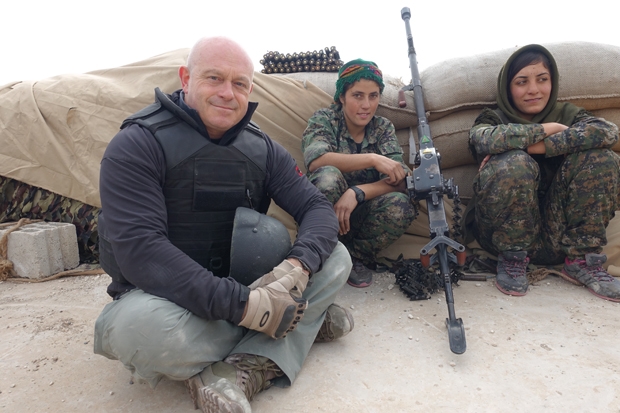Before I set about reviewing Ross Kemp: The Fight Against Isis (Sky 1), I thought I’d have a glance to see whether other critics had been as impressed as I was. Clearly the flip groovester from the Guardian — who opened, inevitably, with a jaunty quip about Grant from EastEnders — had seen a very different documentary from the one I saw. Otherwise, he could not have failed to be moved by Kemp’s heartbreaking interview with the Yazidi woman from Sinjar who’d recently escaped from Isis.
Her 10-year-old daughter squatted beside her — only survivor of the five children she had had when Isis captured her town. The eldest (11) had been immediately commandeered as a sex slave; the three youngest had been deliberately poisoned a few months later by Isis when the family had tried to escape. Pictures of their bodies were posted on social media as a warning to others.
What struck me — as it does time and again with footage like this from Iraq and Syria — is these people’s matter of fact tone as they recount atrocities more befitting the era of the Mongol horde than the age of safe spaces, transgender toilets and Pokémon Go. ‘They killed my mother in front of me,’ volunteers a middle-aged man with a moustache, almost as an afterthought. Horror has become so commonplace they have been brutalised into a numbness you might easily mistake for indifference.
You saw this most chillingly in the eyes of an IS fighter who’d been caught in a police sweep of a recently captured village. His face was hidden by a balaclava; all you could see were murky dead eyes which didn’t even have the decency to look haunted. He’d joined mainly for the $70-a-month regular income, he told Kemp, first al-Qaeda then IS. No, he hadn’t personally beheaded people — they had specialists to do that. And did he have any regrets? ‘When you get captured you look at it and ask: “What is all this for?”,’ said the man, flat and empty, like really all that murdering and crucifixion had been a bit of a fag which, yeah, come to think of it probably hadn’t been the best career move.
This was extraordinary, compelling stuff for which Kemp deserves to win many awards, not least for his quite astonishing personal courage. Even the safer parts of northern Syria — or the new autonomous state of Rojava as its Kurdish captors have optimistically declared it — are impossibly dangerous. Kemp, however, was determined to push himself still closer to the edge by heading to the furthermost outpost on the front line where he played cat and mouse with an IS sniper.
Kemp’s (presumably even braver) cameraman positioned himself so he could film the high-velocity rounds thwacking into the wall above his head. ‘That’s incoming,’ said Kemp, offering a running commentary. ‘That’s incoming. That’s outgoing. That’s incoming. Incoming. Incoming. Fucking incoming.’
For the Guardian’s reviewer this was evidence of some kind of macho death urge. No, actually. It’s a heroic middle-aged bloke laying his arse on the line to bring back dispatches from a struggle being waged, on behalf of freedom, security and civilisation, by some of the most courageous, principled, happy warriors on earth: the Kurdish fighters of the YPG, and their all-women sister outfit the YPJ, who are bearing the brunt of the ground war.
Over lunch with some girl soldiers of the YPJ — pretty, open-faced, smiley, most in their late teens or early twenties — Kemp asked one if she didn’t get scared in combat. ‘No. I’m not a scared person,’ she said. ‘Why not? I’d be scared,’ said Kemp. ‘That’s because you are a normal person. We’re fighting for a cause that’s bigger than us. We’re fighting for our freedom,’ said the girl.
How might this freedom look? Kemp attended a community meeting in Tal Abyad, a town near the Turkish border freed from IS five months earlier. Arabs, Kurds, Turkmen, Armenians, old men and young women gathered round a long table to discuss matters like sugar prices. The new Kurdish state, we were given to understand, is determinedly non-sectarian, egalitarian and big on local democracy. It’s also extremely fragile: after Kemp left, the town was attacked by 100 IS fighters and the fate of the people at that meeting is unknown.
But the greatest threat to Kurdish statehood isn’t Isis, of course, but Turkey, which has long viewed the Kurds as at best a verminous nuisance, at worst terrorist scum. Rojava will never be recognised if Erdogan gets his way. Why do you think the West is proving so dilatory in providing the Kurds the heavy ordnance they so badly need in order to take on IS? Because it would be happier to let these freedom fighters get wiped from the face of the earth than do anything that might upset the power crazed Islamist Erdogan.
Still, in Ross Kemp those plucky Kurds have found their Byron. Let’s hope they’re as successful as the Greeks in ridding themselves of the Ottoman yoke.







Comments